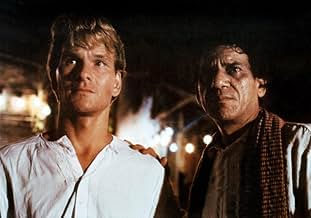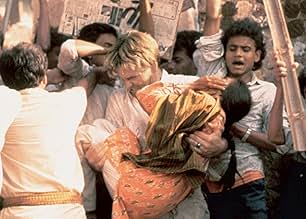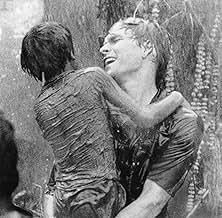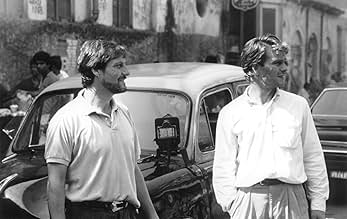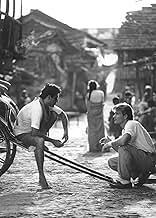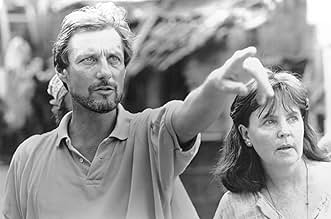IMDb-BEWERTUNG
6,5/10
5852
IHRE BEWERTUNG
Füge eine Handlung in deiner Sprache hinzuAn American doctor, a British nurse, and an illiterate Indian farmer unite to transform a Calcutta ghetto in this uplifting, inspirational movie starring Patrick Swayze and Pauline Collins.An American doctor, a British nurse, and an illiterate Indian farmer unite to transform a Calcutta ghetto in this uplifting, inspirational movie starring Patrick Swayze and Pauline Collins.An American doctor, a British nurse, and an illiterate Indian farmer unite to transform a Calcutta ghetto in this uplifting, inspirational movie starring Patrick Swayze and Pauline Collins.
- Regie
- Drehbuch
- Hauptbesetzung
- Auszeichnungen
- 1 Nominierung insgesamt
Empfohlene Bewertungen
A child dies on an operating table in a Texas hospital. The surgeon, Max Lowe (Patrick Swayze), abandons his practice after the fatality and travels to Calcutta, leaving painful memories behind him. At the same time, in the Indian province of Bihar, Hasari and his family are quitting the land. Two years of drought have reduced them to despair, and now they are drifting to the city, hoping to make a new life there.
The story of the film is that of an impoverished community in Calcutta's backstreets, and how with Max Lowe's help the poor people learn to throw off the yoke of oppression. Max gives of his time and talent, and in return these simple folk teach him new perspectives, and enable him to come to terms with his own regrets.
This film is an example of American insensitivity at its worst. It is extremely patronising in its treatment of Indian society and crude in its handling social and moral issues. The film fails utterly to appreciate that a social system that has existed for thousands of years might not need 'straightening out' by a young man from a 200-year-old culture. All the standard American cliches are trotted out. People are urged to 'stand up and be counted', and to 'make choices in their lives'. Individualism and self-reliance are trumpeted brainlessly, as if they were eternal truths. This is the arrogance of youth. American exporters of films would do well to remember that there are ways of living that happen to be distinct from their own - and far wiser.
The plot is brain-numbingly simplistic. An evil Indian 'godfather' and his (even more evil) son are terrorising the City of Joy. Max preaches rebellion to the local people, exhorting them to reject the feudal system by which they have lived since time immemorial. He has been in India for three weeks, but he know best. The film blithely ignores three essential realities, because they happen to be inconvenient. Firstly, street dwellers such as these have to work too long and too hard, and are too worn down by malnutrition, to stage rebellions and construct new clinics on a foreigner's whim. Secondly, even if an age-old feudal system could be discarded overnight (and it can't), something has to fill the vacuum. The film doesn't come close to hinting what sort of social structure will supplant the godfather's regime. Thirdly, the film arrogantly assumes that the people would turn against their own, with whom they have ancient bonds of blood and custom, in order to side with an American stranger who knows nothing of their way of life, and who is free to pack up and leave whenever he wishes.
Indian people have to behave like Americans, lest they lose the sympathy of the American cinema audience. Poor families have to be too proud to beg for food, but this is nonsense in an Indian context. In reality, Hasari and his wife and children would beg without hesitation - and why shouldn't they? If a prostitute were to lure a foreigner into a robbery, would a local poor man tend the foreigner's wounds? And would the prostitute help him? The preparation of the new clinic is all meaningful bustle and smiling self-help, but these are the values of the American frontier, not the backstreets of Calcutta. Hasari's daughter chooses her husband western-style, via a romance, rather than the arranged marriage which would almost certainly happen in real life.
Everything comes about too easily. Hasari needs to double his income, so he does. Max earns the undying love of Calcutta's poor in a few weeks of grudging voluntary work. In the same timespan, the film gives us the full cycle of birth, death and marriage. People are slashed with razors and make complete (scar-free) recovery, without proper medical attention or modern pharmaceuticals. Max decides on the marriage, not the girl's family, and it's Max who takes the place of honour at the wedding ceremony. That's about as likely as water-skiing on the Ganges.
Ennio Morricone's score is extremely low-key, consisting of little more than a few sitar flourishes. It is almost as if the maestro is embarrassed to be associated with this shallow, tactless film. Max says he travelled to Calcutta to find enlightenment. He would stand a better chance if he didn't carry Texas along in his backpack.
The story of the film is that of an impoverished community in Calcutta's backstreets, and how with Max Lowe's help the poor people learn to throw off the yoke of oppression. Max gives of his time and talent, and in return these simple folk teach him new perspectives, and enable him to come to terms with his own regrets.
This film is an example of American insensitivity at its worst. It is extremely patronising in its treatment of Indian society and crude in its handling social and moral issues. The film fails utterly to appreciate that a social system that has existed for thousands of years might not need 'straightening out' by a young man from a 200-year-old culture. All the standard American cliches are trotted out. People are urged to 'stand up and be counted', and to 'make choices in their lives'. Individualism and self-reliance are trumpeted brainlessly, as if they were eternal truths. This is the arrogance of youth. American exporters of films would do well to remember that there are ways of living that happen to be distinct from their own - and far wiser.
The plot is brain-numbingly simplistic. An evil Indian 'godfather' and his (even more evil) son are terrorising the City of Joy. Max preaches rebellion to the local people, exhorting them to reject the feudal system by which they have lived since time immemorial. He has been in India for three weeks, but he know best. The film blithely ignores three essential realities, because they happen to be inconvenient. Firstly, street dwellers such as these have to work too long and too hard, and are too worn down by malnutrition, to stage rebellions and construct new clinics on a foreigner's whim. Secondly, even if an age-old feudal system could be discarded overnight (and it can't), something has to fill the vacuum. The film doesn't come close to hinting what sort of social structure will supplant the godfather's regime. Thirdly, the film arrogantly assumes that the people would turn against their own, with whom they have ancient bonds of blood and custom, in order to side with an American stranger who knows nothing of their way of life, and who is free to pack up and leave whenever he wishes.
Indian people have to behave like Americans, lest they lose the sympathy of the American cinema audience. Poor families have to be too proud to beg for food, but this is nonsense in an Indian context. In reality, Hasari and his wife and children would beg without hesitation - and why shouldn't they? If a prostitute were to lure a foreigner into a robbery, would a local poor man tend the foreigner's wounds? And would the prostitute help him? The preparation of the new clinic is all meaningful bustle and smiling self-help, but these are the values of the American frontier, not the backstreets of Calcutta. Hasari's daughter chooses her husband western-style, via a romance, rather than the arranged marriage which would almost certainly happen in real life.
Everything comes about too easily. Hasari needs to double his income, so he does. Max earns the undying love of Calcutta's poor in a few weeks of grudging voluntary work. In the same timespan, the film gives us the full cycle of birth, death and marriage. People are slashed with razors and make complete (scar-free) recovery, without proper medical attention or modern pharmaceuticals. Max decides on the marriage, not the girl's family, and it's Max who takes the place of honour at the wedding ceremony. That's about as likely as water-skiing on the Ganges.
Ennio Morricone's score is extremely low-key, consisting of little more than a few sitar flourishes. It is almost as if the maestro is embarrassed to be associated with this shallow, tactless film. Max says he travelled to Calcutta to find enlightenment. He would stand a better chance if he didn't carry Texas along in his backpack.
10knh69
A movie that will carry you to a new place & a new culture you will carry your tears, anger & hope along till the end watching it. The smell of the Indian dust, The pain of the people, The discrepancy between even the poor, A story about a man running to provide the food for his family beside saving money to marry his daughter. A lot of high temper feelings & emotions, you cant stop your eyes from falling. beside talking about the unjust of human beens in isolating a group of innocent people who their fault is that they are not born in complete bodies, the white man in the story who is a doctor failed in the medicine job in his country and ran to India where he found his real soul also show us how we sometimes see the world from one view while it can be seen from a better view, I don't understand why it wasn't dominated for an Oscar. excuse my English & thanks for reading my view.
The movie is not bad. It is based on the book by the same name by Dominique Lapierre, and if my understanding is right has the author's blessings. The characters even have similar if not same names but it is not the same story. However it is true to the spirit in which the book was written.
Another interesting comparison with the book is that just like the movie, the book is as controversial, especially in India and among middle class Indians and Indians abroad. Indians do not like to speak about their slums to foreigners and do not like foreigners to speak about them by themselves. Rich and middle-class Indians who make about one-fourth of the country are the most influential people in the country and make the interlocutors with the Western world. I know because I am one of them. If our country is our home, this is a skeleton in our closet. And because there is a skeleton in our closet, we try not to step into it and do not let other and hate those who do step in when we are not looking. The controversy is an indication that lot stuff in the movie is actually worth seeing.
Also it is not unusual for a poor man in India to choose to die with dignity than live in shame, Indian girls do flirt even if it is 'untraditional' and there are people who try to live by exploiting the poor, people who most others will call cruel.
The movie could have done a better job capturing the fact that western ideas can affect the way some people in India behave just as Indian ideas make some westerners reformulate their ideas and concepts about life. We can see it here, but this is better captured in the book
So those who do not like the movie try to read the book and those who liked the movie will definitely enjoy the book. As for me, stories of the resilience of Indian slum dwellers only make me more proud to be an Indian.
Another interesting comparison with the book is that just like the movie, the book is as controversial, especially in India and among middle class Indians and Indians abroad. Indians do not like to speak about their slums to foreigners and do not like foreigners to speak about them by themselves. Rich and middle-class Indians who make about one-fourth of the country are the most influential people in the country and make the interlocutors with the Western world. I know because I am one of them. If our country is our home, this is a skeleton in our closet. And because there is a skeleton in our closet, we try not to step into it and do not let other and hate those who do step in when we are not looking. The controversy is an indication that lot stuff in the movie is actually worth seeing.
Also it is not unusual for a poor man in India to choose to die with dignity than live in shame, Indian girls do flirt even if it is 'untraditional' and there are people who try to live by exploiting the poor, people who most others will call cruel.
The movie could have done a better job capturing the fact that western ideas can affect the way some people in India behave just as Indian ideas make some westerners reformulate their ideas and concepts about life. We can see it here, but this is better captured in the book
So those who do not like the movie try to read the book and those who liked the movie will definitely enjoy the book. As for me, stories of the resilience of Indian slum dwellers only make me more proud to be an Indian.
This movie is so deep that it touches your heart directly, specially the role played by om puri is inexpressible. Even the role played by patrick swayze was good as he plays an disillusioned doctor. All the casts played good role in the movie.
This movie touches the way of poor people living in calcutta slum, I know because I myself is a bengali and belong to calcutta. The way the poors were reflected in calcutta is actually the way they are treated.
The best quote of the movie was at the end when the movie ends and when om puri says "All that is not given is lost."
This movie touches the way of poor people living in calcutta slum, I know because I myself is a bengali and belong to calcutta. The way the poors were reflected in calcutta is actually the way they are treated.
The best quote of the movie was at the end when the movie ends and when om puri says "All that is not given is lost."
Although the movie might not have the best direction or not one of the best laid picture it still has a lot of good things. If you have visited India (where it has been primarily filmed) and especially Kolkotta city you would see the realistic nature of movie. It depicts the day to day life of a person below the poverty line. It also highlights the morality of foreigners and NGO's who are trying to help the needy. Very often they have to face resistance from local authorities who either want to exploit the masses or think the foreigners are trying to religiously exploit them. In nut shell I liked the movie.
Wusstest du schon
- WissenswertesAmongst the problems that beset the production were fire-bombings, mass demonstrations, media criticism, accusations of murder, a skyrocketing budget that eventually settled at the $27,000,000 mark, and Warner Bros.' 11th hour pullout that nearly bankrupted the producers.
- PatzerThe school girl in the rickshaw gets dropped daily to St. Xavier's School on Park Street - which is an all boys school.
- Zitate
Hasari Pal: All that is not given is lost.
Top-Auswahl
Melde dich zum Bewerten an und greife auf die Watchlist für personalisierte Empfehlungen zu.
- How long is City of Joy?Powered by Alexa
Details
Box Office
- Budget
- 27.000.000 $ (geschätzt)
- Bruttoertrag in den USA und Kanada
- 14.683.921 $
- Eröffnungswochenende in den USA und in Kanada
- 3.405.890 $
- 19. Apr. 1992
- Weltweiter Bruttoertrag
- 14.683.921 $
- Laufzeit2 Stunden 12 Minuten
- Farbe
- Seitenverhältnis
- 1.85 : 1
Zu dieser Seite beitragen
Bearbeitung vorschlagen oder fehlenden Inhalt hinzufügen



